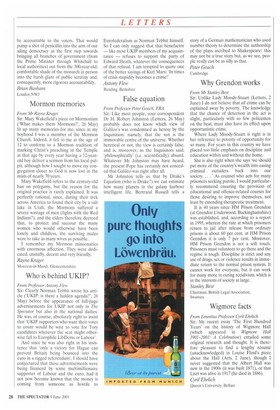Why Grendon works
From Mr Stanley Best Sir: Unlike Lady Moody-Stuart (Letters, 2 June) I do not believe that all crime can be explained away by poverty. The knowledge that the chance of detection in the act is slight, particularly with so few policemen on the beat, must also have its effect upon opportunistic crime.
Where Lady Moody-Stuart is right is in her reference to poverty of opportunity for so many. For years in this country we have placed too little emphasis on discipline and education within and without the home.
She is also right when she says 'we should put more of the country's wealth into easing criminal outsiders back into our society. . . 'As counsel who acts for many prisoners seeking parole, I would particularly recommend ensuring the provision of educational and offence-related courses for those desiring to improve themselves, not least by extending therapeutic treatment.
It is 40 years since HM Prison Grendon (at Grendon Underwood, Buckinghamshire) was established, and, according to a report in 1995, whereas the rate at which prisoners return to jail after release from ordinary prisons is about 60 per cent, at HM Prison Grendon it is only 7 per cent. Moreover, HM Prison Grendon is not a soft touch. Prisoners must volunteer to go there and the regime is tough. Discipline is strict and any use of drugs, sex or violence results in immediate return to the normal prison system. It cannot work for everyone, but it can work for many more in curing recidivism, which is in the interests of society at large.
Stanley Best
Chairman, British Legal Association, Swansea


































































 Previous page
Previous page